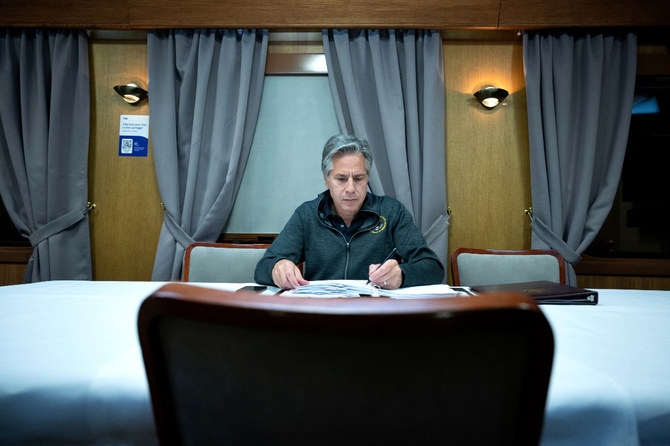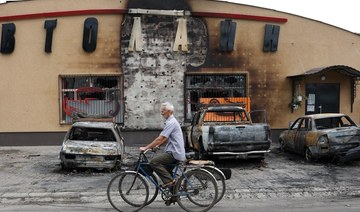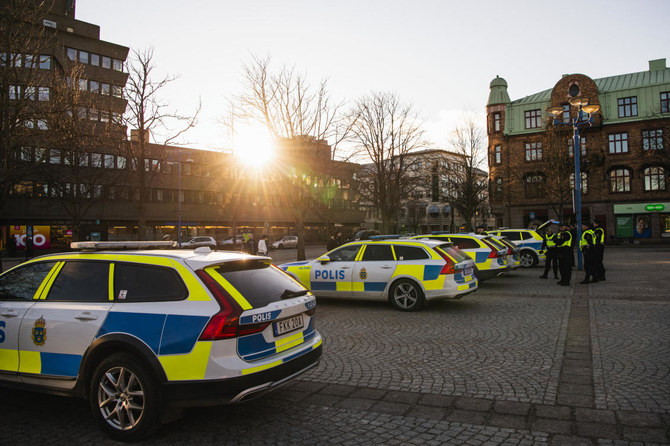KYIV: US Secretary of State Antony Blinken visited Kyiv on Wednesday in a gesture of support for Ukraine as its three-month-old counteroffensive against Russian forces grinds on with only small gains.
During his two-day visit, Blinken is likely to announce a new package of US wartime assistance worth more than $1 billion, a senior State Department official told reporters on the trip.
Blinken, the first top US official to visit Kyiv since the counteroffensive began in early June, began talks with Foreign Minister Dmytro Kuleba and was due to meet President Volodymyr Zelensky, the official said.
“We want to make sure that Ukraine has what it needs, not only to succeed in the counteroffensive, but has what it needs for the long term, to make sure that it has a strong deterrent,” Blinken said standing alongside Kuleba.
“We’re also determined to continue to work with our partners as they build and rebuild a strong economy, strong democracy.”
Media reports have cited unidentified US officials as saying the Ukrainian counteroffensive has been too slow and hindered by poor tactics — criticism that angered Ukrainian officials and prompted Kuleba to tell critics to “shut up.”
Ukraine has retaken more than a dozen villages and small settlements in its offensive. But its push into Russian-held territory has been slowed by minefields and trenches, and Russian air strikes have continued across Ukraine, with Kyiv coming under attack only hours before Blinken’s arrival.
US officials have not publicly criticized Ukraine’s military tactics, and last week said they had seen notable Ukrainian progress in the previous 72 hours of its push in the southeast.
The State Department official said Washington wanted to discuss how the counteroffensive was going and assess battlefield needs as well as any steps that might be required to shore up Ukraine’s energy security before winter.
“I think what’s most important is that we get a real assessment from the Ukrainians themselves,” the official said. “We want to see, hear how they intend to push forward in the coming weeks.”
Asked about Blinken’s visit, Kremlin spokesman Dmitry Peskov said Moscow believed Washington planned to continue funding Ukraine’s military “to wage this war to the last Ukrainian.” He said US aid to Kyiv would not affect the course of Russia’s ‘special military operation’.
RISING OPPOSITION TO UKRAINE AID
Blinken’s visit follows the dismissal this week of Oleksii Reznikov who, as Ukraine’s defense minister, had lobbied Washington and its allies for arms to fight the Russian invaders. Parliament was expected to confirm former lawmaker Rustem Umerov as his successor.
During his train ride to Kyiv, Blinken also held talks with Danish Prime Minister Mette Frederiksen — coincidentally visiting the same day. Blinken thanked Frederiksen for “Denmark’s leadership in the F-16 coalition of partner nations to train Ukrainian pilots, and for its decision to donate F-16 jets to Ukraine,” State Department spokesperson Matthew Miller said.
Denmark and the Netherlands announced last month they would supply more than 60 US-made F-16 fighter jets to Ukraine as soon as pilots are trained to fly them, the first countries to offer the jets after winning US approval to send them.
Despite staunch US support for Ukraine so far since Russia’s invasion in February last year, several Republican presidential hopefuls have questioned US aid, fueling concerns over whether Washington will still back Ukraine at the same level once the US 2024 election campaign intensifies.
The US government has so far provided more than $43 billion in weaponry and other military aid to Ukraine. A new package of security assistance is set to be announced this week, Reuters reported on Friday.
US President Joe Biden asked Congress in August to approve about $40 billion in additional spending, including $24 billion for Ukraine and other international needs.
The request could face opposition in Congress, where some far-right Republicans — especially those with close ties to former President Donald Trump — want to pare back the billions in assistance Washington has sent to Ukraine.
























